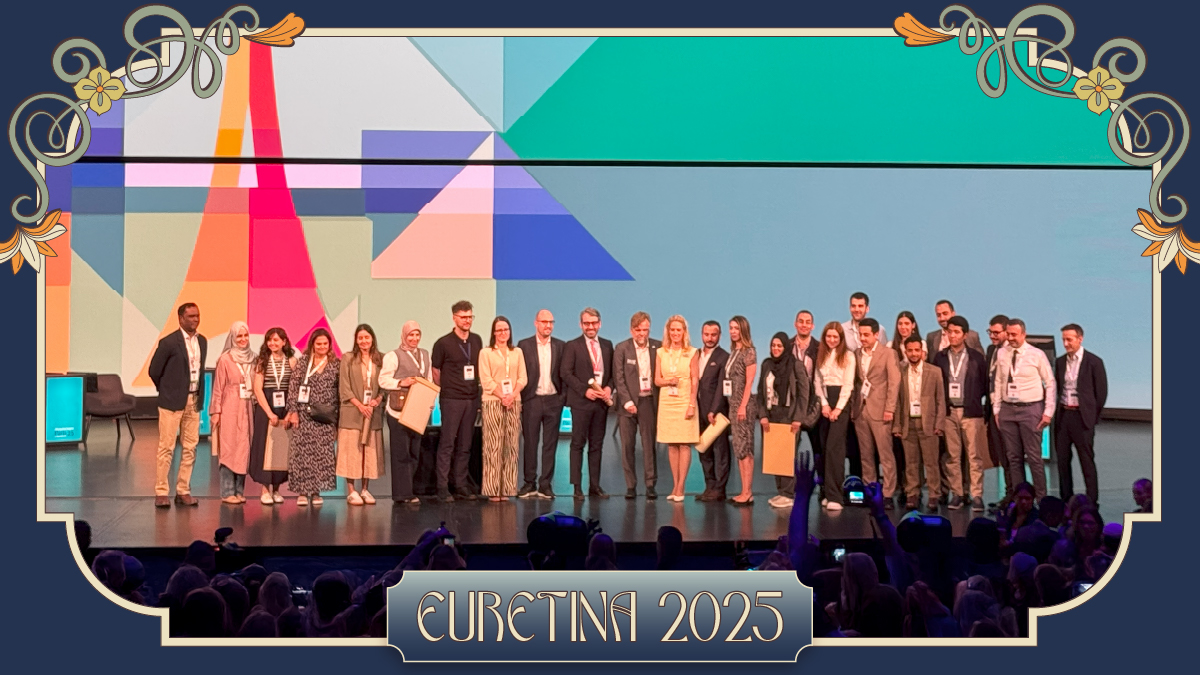The opening ceremony celebrated 25 years of EURETINA with science, stories and rising stars.
When the lights dimmed in the Grand Amphitheater of the Palais des Congrès, there was a palpable sense of history in the air. This wasn’t just another ophthalmology Congress—it was the 25th annual meeting of the European Society of Retina Specialists (EURETINA), a silver jubilee that brought together a record attendance of more than 11,000 participants from across the globe.
The opening ceremony reflected both that journey and the promise of what’s to come, complete with tributes, a visionary keynote and the presentation of prestigious awards that spotlight the next generation of leaders in retinal science.
READ MORE: Retina’s Biggest Event: What Awaits You at EURETINA 2025 in Paris
Prof. Anat Loewenstein rings in EURETINA 2025
EURETINA President Prof. Anat Loewenstein (Israel) opened the ceremony by setting the tone of unity and ambition. “Over these 25 years, EURETINA has grown into one of the most vibrant and respected communities, not only in retina, but also in ophthalmology.”
She also pointed to the record-breaking participation this year. “For the first time in the history of the society, we have surpassed 10,000 registrations. With over 11,000 participants gathered here, it is not only our largest meeting to date—it’s a powerful reflection of the continuous growth, relevance and reach of the EURETINA Society.”
Yet celebration carried a note of remembrance. This Paris meeting inevitably evoked the late Prof. Ramin Tadayoni, whose sudden passing last year was felt deeply across the retina world. The society made space to honor his leadership, collegiality and the legacy of excellence that continues to shape its agenda in his home city.
From Hamburg to Paris: 25 years of EURETINA
Past President Prof. Sebastian Wolf (Switzerland) then took the stage, offering a lively history of the society’s origins. He recalled the modest beginnings: a handful of European leaders in ophthalmology meeting in Hamburg in July 2000, determined to create a pan-European platform for retinal science.
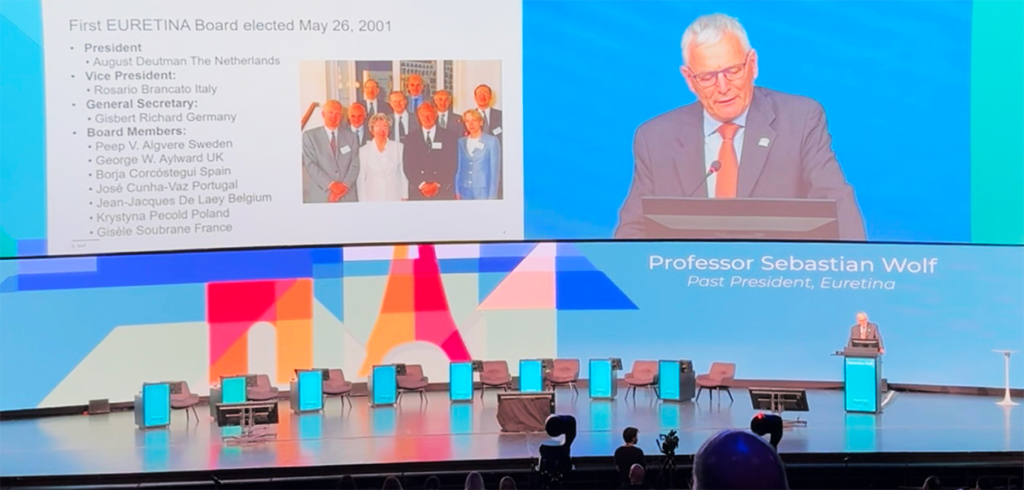
“The founding members that evening were Profs. August Deutman, Gisbert Richard and Dr. Borja Corcostegui,” he recounted. “The first official EURETINA meeting had 200 participants. Today, we are over 10,000.”
Wolf highlighted not only the growth in numbers but in initiatives: the Women in Retina program, the creation of clinical research awards and the society’s ability to fund “several hundred thousand euros every year to research from the reserves we have.”
READ MORE: Empowering Women, Revolutionizing Retina
He also noted the society’s resilience during the COVID-19 pandemic: “We had very successful virtual meetings, monthly webinars and educational programs that contributed immensely to our field.” His conclusion was simple but stirring: “I have to congratulate 25 years of EURETINA. I hope it’s another 250 years where EURETINA will be successful.”
Put simply: a meeting that once fit a single lecture hall has matured into a global reference point for retinal science.
Keynote Lecture: AI and the future of AMD care
The 25th anniversary congress of EURETINA turned its gaze firmly to the future with a keynote lecture from Prof. Ursula Schmidt-Erfurth (Austria), who explored how artificial intelligence (AI) is reshaping the understanding, diagnosis and management of AMD.
“Clearly AI is here. I believe AI is here to stay,” she said, framing the technology not as a distant promise, but a tool already transforming practice. With intravitreal injections ranking as the most frequent medical intervention worldwide, she argued, clinicians need AI to revolutionize both drug development and day-to-day care.
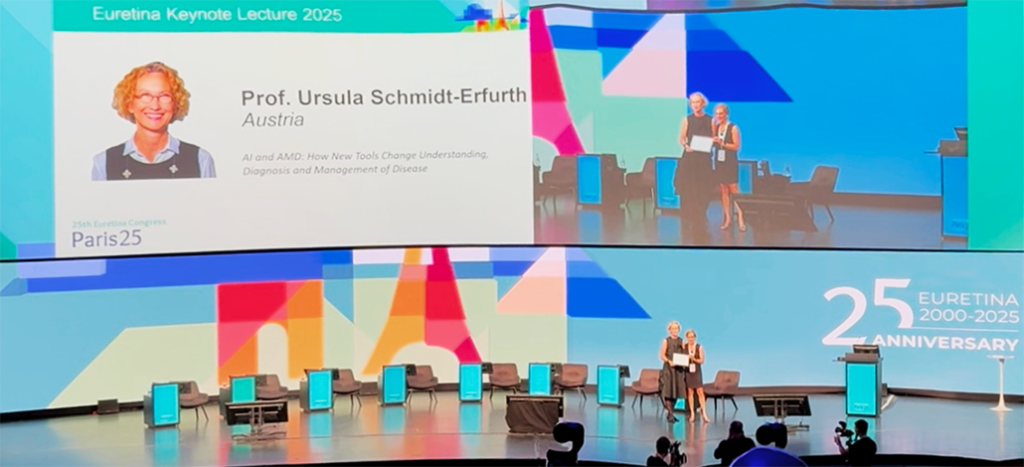
READ MORE: 4 Reasons Why AI Is Important in Medical Image Analysis
Central to her message was the rethinking of retinal fluid. “Retinal fluid is not just fluid. It comes in compartments and it comes in volumes—and both matter.” Data from large trials such as the HAWK and HARRIER trials have shown that monthly treatment better reduces intraretinal and subretinal fluid, while volume—not central retinal thickness—is the strongest predictor of functional outcomes.1
AI-based OCT analysis now allows clinicians to quantify these fluid dynamics in real time, helping distinguish responders from non-responders and optimize treatment intervals.
Her lecture then turned to geographic atrophy (GA). Here, the ellipsoid zone (EZ) has emerged as a key biomarker, reflecting photoreceptor integrity long before RPE loss becomes visible. “Photoreceptors die first, they flatten out and then the RPE follows secondarily,” she explained. AI-driven EZ mapping and targeted microperimetry can now predict functional decline with striking precision, enabling earlier and more effective interventions.
READ MORE: FDA Expands Label for Izervay in Geographic Atrophy Treatment
Schmidt-Erfurth concluded with a call to action. Screening tools like the I-SCREEN Platform, which connects community clinics and optometrists through AI algorithms, could soon bring AMD risk detection to millions.2
“We have all the tools,” she said. “The future is not to wait until disease is manifested—but to prevent conversion.”
Recognizing leaders and rising stars in retina
Ceremony also means recognition, and this year’s opening honored individuals across the research and clinical spectrum.
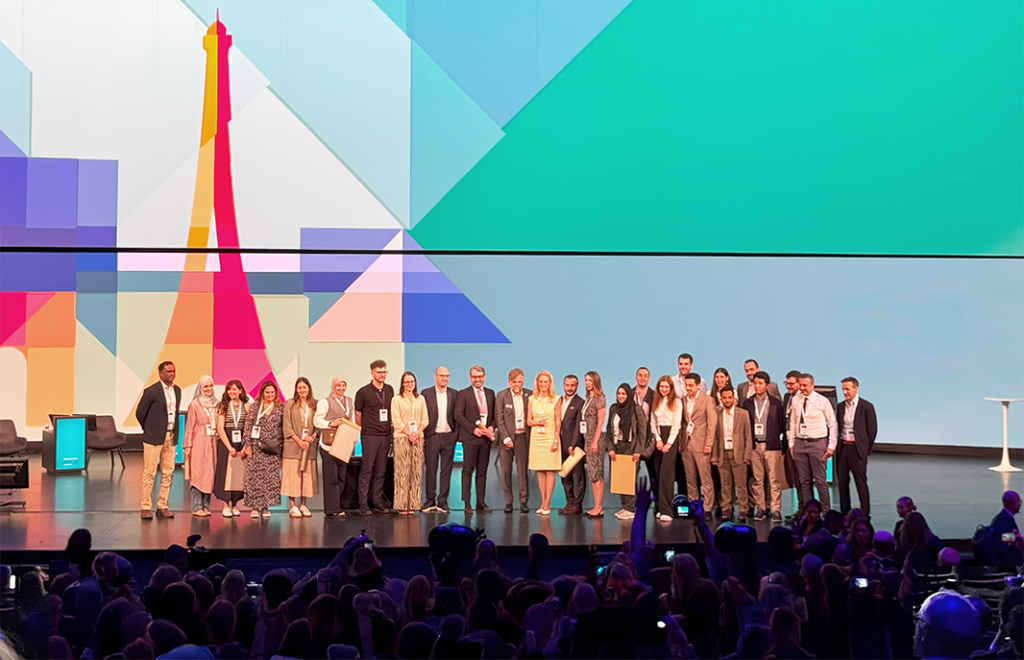
1. Ramin Tadayoni Award 2025
Presented by Prof. Martin Zinkernagel (Switzerland), the award recognized innovative postgraduate research in memory of the late EURETINA President.
This year’s winner: Prithvi Ramtohul (Aix-Marseille University, France).
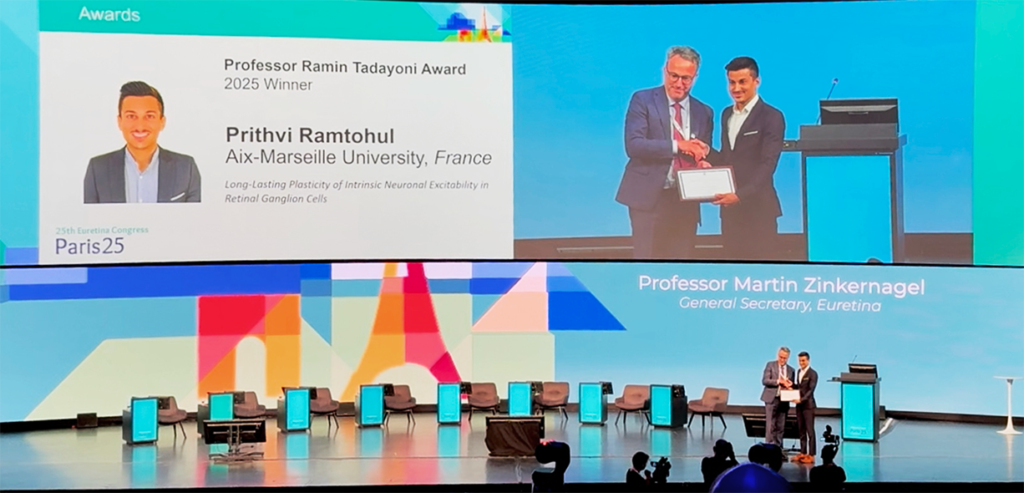
2. EURETINA Retinal Medicine Clinical Research Awards
Announced by Prof. Reinier Schlingemann (Netherlands), this year’s awards, fully funded by the society, highlight the organization’s commitment to advancing independent European research.
Winners included Dr. Joseph Huemer (Moorfields Eye Hospital, UK), who will use deep learning and genome-wide association studies (GWAS) to analyze OCT biomarkers for cardiovascular disease, and Dr. Kanmin Xue (Oxford, UK), who will assess risk factors in retinopathy of prematurity (ROP) progression and the effects of anti-VEGF on neurodevelopment.
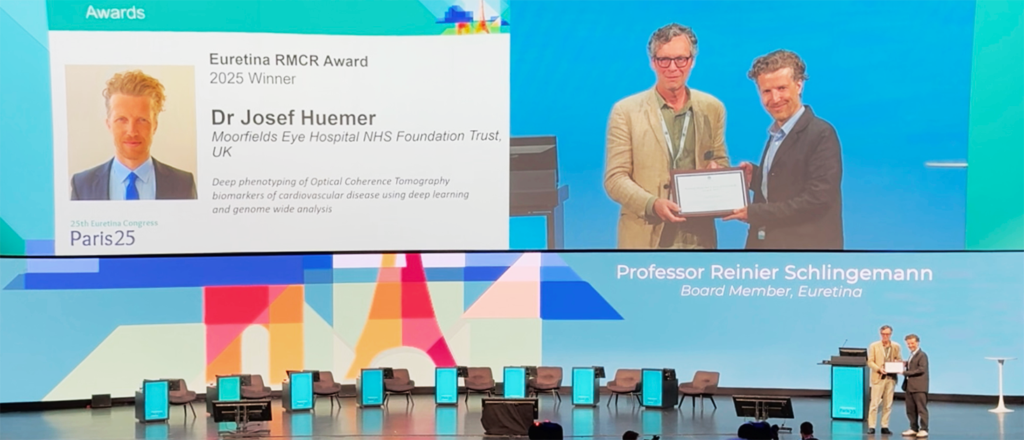
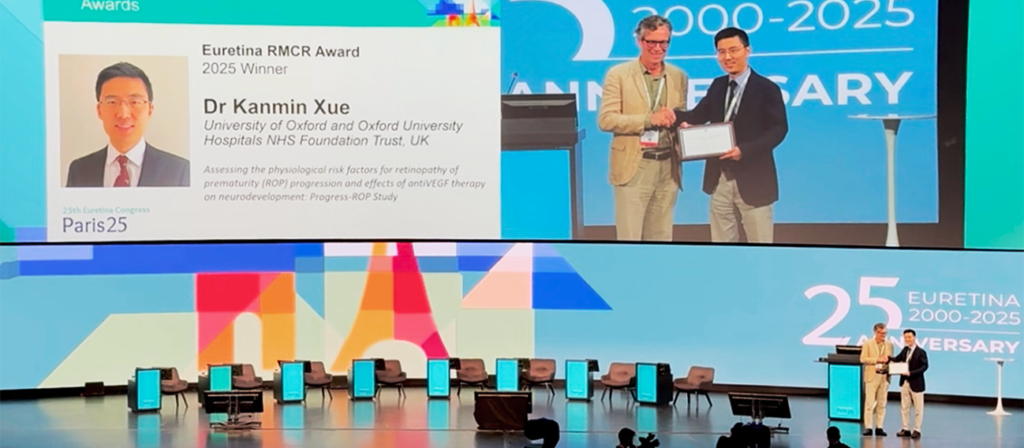
3. August Deutman Awards
The August Deutman Awards celebrated the best in free papers, posters and video presentations, recognizing the creativity and rigor of retina specialists worldwide.
Best free papers
- 1st Place: Roy Schwartz (UK) – Can visual acuity be estimated from multimodal imaging of GA in AMD?
- 2nd Place: Shivesh Varma (Australia) – Is vitreoretinal traction the cause of ‘Combined Hamartoma of the Retina and Retinal Pigment Epithelium’ (CHRRPE)?
- 3rd Place: Raffaele Parrozzani (Italy) – Reduction of Myopia of Prematurity Progression Using Highly Aspheric Lenses Target Technology (H.A.L.T.)
Best e-posters
- 1st Place: Saoud Al-Khuzaei (UK) – Genotype-Phenotype correlation in IMPG2 Retinopathy
- 2nd Place: Ignacio Flores-Moreno (Spain) – Tractional Myopic Maculopathy, Progression Study
- 3rd Place: Kensuke Muto (Japan) – Phenotypic features of EYS-related retinitis pigmentosa associated with the c.2528 G>A (p.Gly843Glu) in the Japanese population
Best videos
- 1st Place: Elizabeth Yang (Italy) – Scleral sutured IOL and artificial iris and penetrating keratoplasty, a triple-procedure
- 2nd Place: Kshitij Raizada (India) – Duel with Sub-Retinal Cysticercus
- 3rd Place: David Pérez González (Mexico) – 10 steps for performing pars plana vitrectomy in proliferative diabetic retinopathy
4. Highest scoring EBO exam candidate
Prof. Nicole Eter (Germany) announced that Carl Joe Mehanna (France) was this year’s highest EBO achiever with an 86% score.
5. Honorary FEBOS Diploma
Dr. Marcin Stopa (Chair, Educational Committee of EBO) also honored two leaders whose vision and dedication shaped the exam into a trusted benchmark for retinal competence: Prof. Nicole Eter and Prof. Jens Folke Kiilgaard (Denmark), both awarded honorary diplomas for their contributions.
Explore the latest retina breakthroughs in our daily EURETINA coverage.
Editor’s Note: The 25th annual meeting of the European Society of Retina Specialists (EURETINA 2025) is being held from 4–7 September in Paris, France. Reporting for this story took place during the event. This content is intended exclusively for healthcare professionals and may reference products or therapies not approved in all jurisdictions.
References
- Dugel PU, Koh A, Ogura Y, et al; HAWK and HARRIER Study Investigators. HAWK and HARRIER: Phase 3, Multicenter, Randomized, Double-Masked Trials of Brolucizumab for Neovascular Age-Related Macular Degeneration. Ophthalmology. 2020;127(1):72-84.
- Revolutionising Eye Health: New I-SCREEN Project Integrates Artificial Intelligence (AI) for Early Detection of Age-Related Macular Degeneration. Published March 25, 2024. Available at: https://i-screen.eu/news/revolutionising-eye-health-new-i-screen-project-integrates-artificial-intelligence-ai-for-early-detection-of-age-related-macular-degeneration Accessed September 4, 2025.
